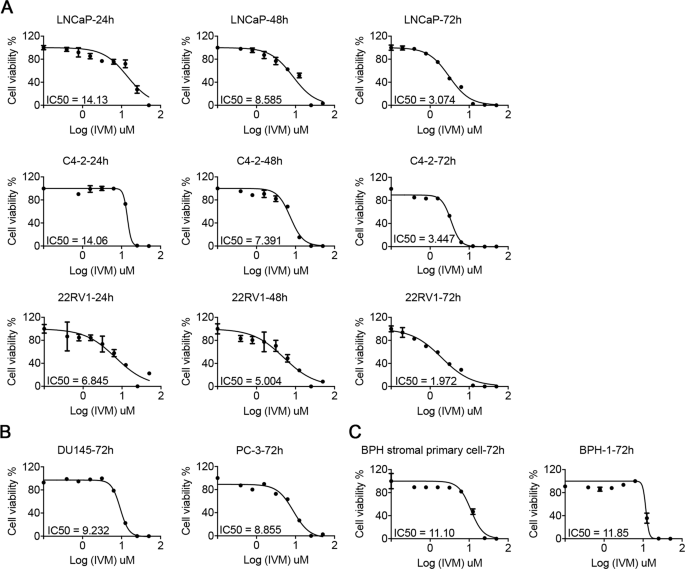Deleted member 43589
Well-Known Member
Ivermectin in Oncology – The Science
In laboratory, Ivermectin has been shown to be able to kill cancer cells of many types, such as- Breast Cancer (Ref.1, Ref.2, Ref.3)
- Ovarian Cancer (Ref.1, Ref.2)
- Prostate Cancer (Ref.)
- Colorectal Cancer (Ref,)
- Brain Cancer (Ref.1, Ref.2, Ref.3, Ref.4)
- Renal Cancer (Ref.)
- Leukemia (Ref.)
- AML (Ref.)
- Hepatocellular carcinoma (Ref.)
- Lung Cancer (Ref.1, Ref.2)
- and many others.
Ivermectin is a widely used antiparasitic drug and shows promising anticancer activity in various cancer types.
Prostate Cancer
Conclusion
In summary, our results indicate that ivermectin suppressed the AR and E2F signaling pathways and DNA damage repair capacity by targeting FOXA1 and Ku70/Ku80 to inhibit cell proliferation and promote cell apoptosis in prostate cancer. These findings provide insight into both the effects and mechanisms of ivermectin as an anticancer agent. This raises the possibility of broadening the clinical evaluation of ivermectin for the treatment of prostate cancer.
Integrated analysis reveals FOXA1 and Ku70/Ku80 as targets of ivermectin in prostate cancer - Cell Death & Disease
Ivermectin is a widely used antiparasitic drug and shows promising anticancer activity in various cancer types. Although multiple signaling pathways modulated by ivermectin have been identified in tumor cells, few studies have focused on the exact target of ivermectin. Herein, we report the...
Highlights
- Ivermectin effectively suppresses the proliferation and metastasis of cancer cells and promotes cancer cell death at doses that are nontoxic to normal cells.
- Ivermectin shows excellent efficacy against conventional chemotherapy drug-resistant cancer cells and reverses multidrug resistance.
- Ivermectin combined with other chemotherapy drugs or targeted drugs has powerful effects on cancer.
- The structure of crosstalk centered on PAK1 kinase reveals the mechanism by which ivermectin regulates multiple signaling pathways.
- Ivermectin has been used to treat parasitic diseases in humans for many years and can quickly enter clinical trials for the treatment of tumors.

Ivermectin, a potential anticancer drug derived from an antiparasitic drug
Ivermectin is a macrolide antiparasitic drug with a 16-membered ring that is widely used for the treatment of many parasitic diseases such as river bl…
 www.sciencedirect.com
www.sciencedirect.com
Conclusion: Our results on the antitumor effects of ivermectin support its clinical testing.

Antitumor effects of ivermectin at clinically feasible concentrations support its clinical development as a repositioned cancer drug - PubMed
Our results on the antitumor effects of ivermectin support its clinical testing.
It was found that Ivermectin can decrease the cell density of RPMI myeloma cells without causing cell death, but no clinically relevant effect was found in HCT colorectal cancer cells.
Full Abstract
Here is a list of anti cancer mechanisms related to Ivermectin:
- Can trigger “Immunogenic Cancer Cell Death”. This is a form of cancer cell death that “wakes up” the immune system and therefore initiates an immune response. As a result, it has been proposed that Ivermectin could be a great combination with forms of immuno therapy such as checkpoint inhibitors. (Ref.)
- Downregulates glutathione S-transferases (GSTs) and vascular endothelial growth factor (VEGF) (Ref.)
- Potentiated activity of anti–androgen receptor and anti-EGFR drugs (Ref.)
- Inhibited cancer stem‑like cells (CSC) (Ref.)
- Inhibits angiogenesis (Ref.)
- Inhibition of metastasis (Ref.)
- WNT pathway inhibitor (Ref.1)
- Increased reactive oxygen species generation that was functionally important for ivermectin-induced cell death (Ref.)
- Microtubule inhibitor (Ref.)
- Multi Drug Resistance Pumps inhibitor (Ref.)
- At a higher dose, Ivermectin can inactivate the protein kinase PAK1 and blocks the PAK1 dependent growth – PAK1 is critical for cytoskeleton reorganization and nuclear signaling. PAK-1 kinase is required for the growth of more than 70% of human cancers (Ref.) This activity is similar to Caffeic Acid from Propolis.
Synergistic Anti-tumor Effect of Dichloroacetate and Ivermectin - PMC
We formerly reported that the combination of dichloroacetate, omeprazole, and tamoxifen blocked cancer progression by reducing lactic acid production and inducing superoxide production. Recently, ivermectin, a well-known anti-parasite drug, was ...
Last edited:
















